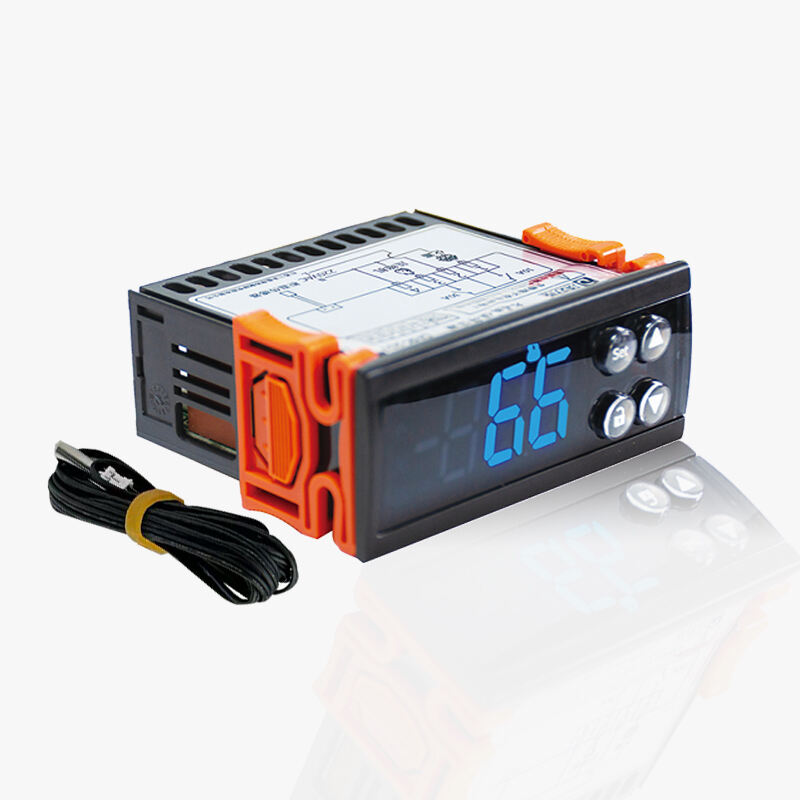Choosing the Right Control System for Modern Freezers
Understanding the Role of Temperature Controls
Temperature control remains crucial for freezers no matter if someone runs a restaurant kitchen or just keeps leftovers in their basement fridge. These controls manage the inside environment so food doesn't rot away and electricity bills don't skyrocket. Back in the day, people relied on simple mechanical thermostats, but nowadays we see plenty of digital options too. Each type works differently, some better suited for certain situations than others depending on how much money folks want to spend versus what kind of reliability they need from their appliances.
The Evolution of Freezer Control Technology
Mechanical thermostats were once the default choice, offering simple, analog temperature regulation. As technology advanced, digital systems emerged with enhanced precision, programmability, and features. Today, the debate continues as to which type offers better value and performance for different freezer applications.
How Mechanical Temperature Controls Work
Simple and Reliable Mechanism
Mechanical temperature controls operate using a thermostat connected to a capillary tube filled with gas or fluid. As the internal temperature changes, the gas expands or contracts, activating a switch that controls the compressor. This analog method is known for its durability and ease of maintenance.
Key Advantages in Traditional Settings
One of the strongest features of mechanical controls is their resilience to extreme environmental conditions. They function well in cold storage areas or facilities with unstable power supplies. These systems rarely fail suddenly and can be repaired without specialized tools or training.
Limitations in Accuracy
Mechanical thermostats often have wider temperature fluctuations between activation and shut-off. They lack precision, making them less ideal for applications where maintaining a tight temperature range is essential. Additionally, there is no display or digital readout to monitor performance easily.
The Rise of Digital Temperature Controls
Precision and Programmability
Digital systems use electronic sensors and microprocessors to maintain highly accurate temperature levels. Users can input exact temperature settings and view current readings on a digital screen. These features are particularly valuable for storing pharmaceuticals, sensitive food items, or conducting lab research.
Smart Features for Modern Needs
Many digital temperature controls include alarms, remote monitoring, and data logging capabilities. They can detect minor fluctuations quickly and alert the user, helping prevent spoilage. Some models are compatible with Wi-Fi or Bluetooth, allowing adjustments and oversight from mobile devices or centralized systems.
Maintenance and Vulnerabilities
While digital systems provide a high degree of control, they rely on electronics that may be more susceptible to power surges or humidity. Repair often requires a trained technician, and component replacement can be more costly compared to mechanical counterparts.
Comparing Performance in Freezer Applications
Temperature Consistency
Digital controllers outperform mechanical ones in terms of holding a steady internal environment. For businesses that need a consistent temperatureâsuch as medical laboratories or gourmet food suppliersâdigital precision is unmatched.
Mechanical systems, on the other hand, are more tolerant of rough handling and less sensitive to slight calibration errors. For less temperature-sensitive storage, they remain a cost-effective solution.
Energy Efficiency
Digital systems generally lead to more efficient compressor cycles, reducing energy consumption over time. This is due to the microprocessorâs ability to optimize compressor activation based on real-time temperature data. Mechanical systems, with their broader temperature swings, tend to result in more frequent or prolonged compressor use.
User Experience
Digital controls offer a more user-friendly experience. The ability to adjust and monitor freezer performance with clear feedback adds convenience. Mechanical systems may require users to interpret dial positions or listen for compressor sounds to determine if the freezer is functioning correctly.

Choosing Based on Application
Commercial vs. Residential Use
Commercial environments often favor digital controls because of the need for precision and compliance with food safety regulations. Temperature logs, alarms, and consistent control help businesses pass inspections and reduce liability.
In residential settings, the simpler mechanical control may suffice, especially in chest freezers or backup units. These systems are generally more affordable and adequate for storing frozen meats, vegetables, or packaged goods.
Specialized Requirements
Some industries, such as biotechnology, blood storage, and vaccine distribution, demand the reliability and accuracy that only digital controls can provide. Conversely, rural or off-grid settings where power irregularities are common may benefit from the ruggedness of mechanical systems.
Cost Considerations
Initial costs for mechanical controls are usually lower, and repairs tend to be less expensive. Digital systems carry a higher upfront investment, but they may result in lower operational costs due to reduced energy consumption and fewer spoilage incidents over time.
Future Trends in Freezer Technology
Integration with Smart Systems
Digital controls are increasingly being integrated into smart appliances that can communicate with home automation systems or industrial software platforms. This trend is expected to expand, making remote monitoring and control the norm for new freezer models.
Hybrid Approaches
Some manufacturers are developing hybrid control systems that combine mechanical backup with digital interfaces. These offer the reliability of analog hardware with the convenience and precision of modern softwareâa potential best-of-both-worlds solution.
Sustainability and Compliance
As energy efficiency and environmental impact become greater concerns, digital temperature controls are aligning with stricter industry standards and certifications. Mechanical systems, while dependable, may struggle to meet future regulatory demands without redesign.
FAQ
Are digital temperature controls more accurate than mechanical ones?
Yes, digital controls provide more precise temperature regulation and real-time feedback, which is particularly useful in environments where consistency is crucial.
Can mechanical temperature controls be upgraded to digital?
In many cases, yes. However, the conversion requires some technical modifications and may void existing warranties. Consult a technician before attempting any upgrades.
Which is more cost-effective in the long run?
Digital systems may offer better energy efficiency and reduced spoilage costs, making them more cost-effective over time despite a higher initial investment.
Are digital systems more prone to failure?
They are more sensitive to moisture and power fluctuations but include features like alarms to warn users before total failure occurs. Regular maintenance and surge protection can mitigate most risks.

